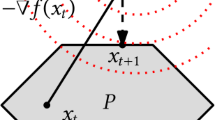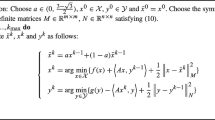Abstract
In nonlinear optimization, the dual problem is in general not easier to solve than the primal problem. Convex separable optimization problems, frequently arising in electrical and mechanical engineering, constitute a notable exception to the above rule. The dual problem is to optimize the dual objective functionℓ over a non-negative orthant, and the evaluation ofℓ reduces to the execution of independentlinear searches only. To generalize the idea, we also consider partially-separable problems with objective and constraint functions such that the Hessian matrix of the Lagrange function is a block-diagonal matrix with 2*2 blocks. The evaluation of the dual objective function is accordingly reduced to a number of independentplanar searches. Obviously, 3*3 blocks would lead tospatial searches, etc. We compare the performance of a primal and a dual method on a graded set of artificial test problems with increasing size, increasing degree of degeneracy, and increasing ill-conditioning. The observed speed-up by the dual approach varies between 2 and 30. Finally, we consider the potential of the dual approach for execution on parallel computers.
Similar content being viewed by others
References and bibliography
Avriel, M. 1976:Nonlinear programming. Englewood Cliffs, New Jersey: Prentice Hall
Bitran, G.R.; Hax, A.C. 1979: On the solution of convex knapsack problems with bounded variables. In: Prekopa, A. (ed.)Survey of mathematical programming, pp. 357–367. Amsterdam: North-Holland
van den Bosch, P.P.J.; Lootsma, F.A. 1987: Scheduling of power generation via large-scale nonlinear optimization.J. Optimiz. Theory and Appl. 55, 313–326
Buys, J.D. 1972:Dual algorithms for constrained optimization problems. Thesis, Univ. of Leiden, The Netherlands
Dayde, M. 1986:Parallélisation d'algorithmes d'optimisation pour des problémes d'optimum design. Thèse, Institut National Polytechnique de Toulouse, France
Lescrenier, M.; Toint, Ph.L. 1987:Large-scale nonlinear optimization on the FPS164 and CRAY X-MP vector processors. Rep. CSS 205, Harwell Laboratory, Oxfordshire OX11 ORA, England
Lootsma, F.A.; Ragsdell, K.M. 1988: State-of-the-art in parallel nonlinear optimization.Parallel Computing 6, 133–155
Roode, J.D. 1968:Generalized Lagrangian functions in mathematical programming. Thesis, Univ. of Leiden, The Netherlands
Rosen, J.D.; Suzuki, S. 1965: Construction of nonlinear programming test problems.Communications of the ACM 8, 113
Schmit, L.A.; Fleury, C. 1980: Structural synthesis by combining approximation concepts and dual methods.J. Amer. Inst. Aeronaut. Astronaut. 18, 1252–1260
Zenios, S.A.; Lasken, R.A. 1987: Nonlinear network optimization on a massively parallel connection machine. Rep. 87-08-03, The Wharton School, Univ. of Pennsylvania, Philadelphia, PA 19104. Also:Annals Oper. Res. (to appear)
Author information
Authors and Affiliations
Rights and permissions
About this article
Cite this article
Lootsma, F.A. A comparative study of primal and dual approaches for solving separable and partially-separable nonlinear optimization problems. Structural Optimization 1, 73–79 (1989). https://doi.org/10.1007/BF01637663
Received:
Issue Date:
DOI: https://doi.org/10.1007/BF01637663




